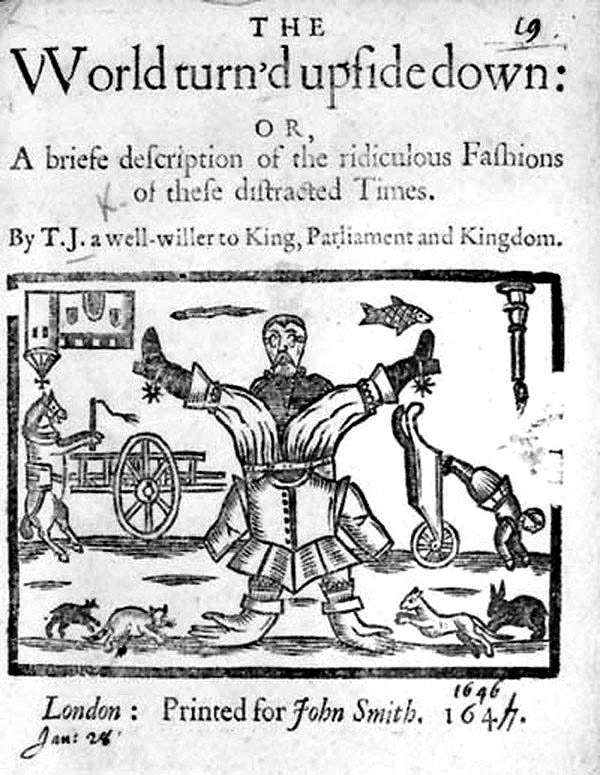Liberty Matters
Whose Tyranny? The Question of Limits on Popular Sovereignty

I was struck and slightly disquieted by Iain's closing point that the most pertinent legacy of the Levellers is the limits they placed on popular sovereignty and on the efficacy of the "will of the people." As Steve noted, I had also emphasized those limits in my response to his essay, but I think with a slightly different emphasis from Iain's. My instinct is that it is the Levellers' difficult and continuing dialogue between popular sovereignty and parliamentary government that we need to hang on to in our own difficult times, rather than elevating one side of the equation over the other.
Of course I understand where Iain is coming from: in the UK at the moment we see the "will of the people" being reified and weaponized in stultifying and one-dimensional ways, and anyone who cares about the rights and welfare of minorities has to be alarmed by the danger of the current global crop of populist (I've given in to the term, although I hate it) politicians using the majoritarian levers of democratic systems to attack or marginalize minority groups in the name of popular opinion. The Levellers did not call themselves democrats, in spite of proposing a system of government which is clearly a representative democracy in our terms; but the term democracy became surprisingly current in the subsequent political debates among republicans in the 1650s, and with it, an all-too-familiar set of debates about how far the people were to be trusted with decision-making even in a republican or democratic state.
Did the Levellers themselves acknowledge that the people can be mistaken? Were their limits on the popular will inspired by this fear? In general, I would say no – but that is partly a function of the timing of the Leveller movement and of their self-presentation as defenders of a universalized set of English liberties, which it would be hard to suggest their owners would repudiate. But the Levellers did also present themselves as the "well-affected" and "honest," in contradistinction to others, and they had a perpetual concern with the political education of the people which reflected the constant fear that the people were being misled. But of course the statement of the first Agreement of the People that "it cannot be imagined that so many of our Country-men would have opposed us in this quarrel, if they had understood their owne good" was accompanied by a confident hope ("we may safely promise to ourselves") that "when our Common Rights and liberties shall be cleared, their endeavours will be disappointed, that seek to make themselves our Masters." It was apparently possible to ensure that the people had a right understanding of their own interests.
But of course this was a difficult position to maintain as the 1640s gave way to the 1650s and all were aware that any free election would return MPs who would restore the monarchy. This fact is responsible for republicans' bouts of furious despair about the stubborn failure of the "image-doting rabble" to throw off monarchical culture. John Milton's prose works engage in a notoriously torturous set of negotiations with the idea of the people, given that in the abstract they legitimized the republic, but in practice clearly tolerated it at best and could not be trusted to vote for its continued existence. Milton thus tended to shrink from the notion of a "democracy" and was ultimately prepared to defend the republic by instituting a perpetual senate without a lower house. James Harrington, by contrast, did call his ideal republic a democracy or popular government, but outlined an elaborate electoral system in which multiple layers of representation from local level upwards yielded two houses: a debating senate and a larger and less aristocratic house which was only to decide on the proposals from the more select house in silence. (Contrast these multiple layers of representation with Richard Overton's vision of true representation as a single-step process and no more.) The much-mediated popular will was reduced to making yes/no decisions on proposals elaborated by a wiser few.
But it was rare for the Levellers to express this level of distrust of the people. Overton most closely prefigured Milton's condemnations of the servile deficiencies of the people, arguing in his Defiance against all Arbitrary Usurpations (1646) that "the poore deceived people are even (in a manner) bestiallized in their understandings, become so stupid, and grosly ignorant of themselves" that they were reduced to the level of animals who could not claim their human freedoms. Nonetheless, the Levellers' limits on popular sovereignty were largely intended to limit the power of the institutions which were legitimized by that popular sovereignty, and their main target was the potential tyranny of the parliament, not that of the people. Both popular and parliamentary sovereignty were limited by the higher power of God and the purposes of reason and nature – but the struggle to define the relationship between the two, and to create a political system supple enough to respond effectively to the people but resilient enough not to unmake itself, is what animated Leveller thought.
Copyright and Fair Use Statement
“Liberty Matters” is the copyright of Liberty Fund, Inc. This material is put on line to further the educational goals of Liberty Fund, Inc. These essays and responses may be quoted and otherwise used under “fair use” provisions for educational and academic purposes. To reprint these essays in course booklets requires the prior permission of Liberty Fund, Inc. Please contact oll@libertyfund.org if you have any questions.